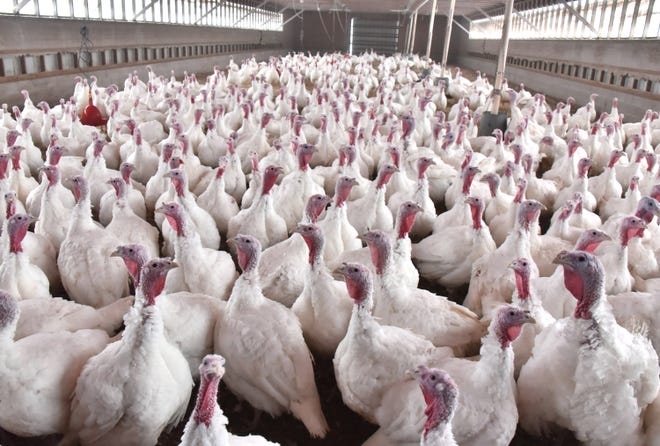When I was a kid growing up on our small homestead, my favorite animal to raise was turkey🦃. They are friendlier than chickens, great foragers and they GOBBLE! They would quickly become attached to us and follow us around the farm like puppies. I loved the sounds they would make and would spend hours with them learning to imitate their calls, clicks and gobbles.
Fast forward 15 years. Justin and I are newly married, living in a nice subdivision in Allendale, MI. About a mile north, there is a conventional turkey farm. It wasn't even a large one, but when the breeze headed north, the overwhelming smell of turkey manure would waft over our neighborhood.

Image courtesy of Detroit News.
I would go past this farm on my daily runs. The thousands of turkey heads would peak at me from inside the barn. Back then, it made me sad to see them all caged up, and the smell was horrendous. But I didn't fully comprehend the impact that type of growing was having on the land and health of the people.
Why We Started Rebel
Bringing it full circle to today...Raising turkeys on pasture is not the easier route. It takes a lot more labor, time and risk. It's the way we decided to raise our turkeys because we believe it's the right way.
Meet Our Partner Farm!
Turkeys and chickens are both considered poultry. They have many similiarities in their raising requirements, but are also different in many ways (More on that in the blog). Last year we wanted to provide pasture raised turkey products to our customers, but didn't have the resources or time to add another animal to the farm.
So we searched and searched, and landed on Hehlden farm to help us raise turkeys for both Thanksgiving and retail cuts. ACTUALLY... we didn't have to search too hard because this farm was one of our first friends and mentors in the farming industry. The Hehl family has been incredibly generous with their advice as we grew our farm business.
You've heard it from us before. We are first generation farmers. We don't have the wisdom or knowledge passed down like many farming families. So we have created relationships with those we look up to in order to fill that void.
Their knowledge of pastured poultry and land regeneration has been an ongoing support system for our farm. In fact, they introduced us to the American Pastured Poultry Producers Association and have also attended the annual conference with us for the past two years.
They have been working against Big Ag their entire lives, providing food for their community in small town America. In fact, their Centennial Farm has been working the land for four generations! We believe that partnering with other small farms creates the most resilient food system. Resources are shared, risks are mitigated, and more people are fed from local, sustainable sources.
Let's dig into some specifics about why turkeys are different than chickens and why our turkeys are BETTER than conventionally grown turkeys!
How are Turkeys Raised Differently Than Chickens?
While the overall process is similar to chickens, there are many differences with raising turkeys. Instead of taking you through the entire process, it makes more sense to list them out for you!
- Turkeys stay in the brooder for 8-10 weeks. that's 6-8 weeks longer than chickens!
- It takes 18-22 weeks to grow a turkey to processing size as opposed to 7 weeks for a meat chicken.
- Turkeys are very challenging during the brooding stage because they will pile and suffocate each other if the conditions aren't perfect.
- Once out on pasture, turkeys are hardier than chickens and can withstand weather changes much better.
- Turkeys are more susceptible to certain worms and diseases than chickens. In fact, it's recommended not to run laying hens and turkeys on the same pasture because laying hens can harbor disease that doesn't affect them but will kill turkeys.
- Because they are so much bigger, turkeys a lot more space. This means they require different equipment and less stocking density than chickens.
Why is Rebel Turkey Better than Store Bought, Conventional Turkeys?
The most obvious difference between Pasture Raised and Conventional turkey is access to grass, bugs, sunshine and fresh air. What you need to know is how this access impacts the different aspects of the turkey. This is what must be considered when purchasing turkey products.- Because conventional turkeys are packed so tightly and the manure smell is so strong, they never truly experience fresh air, even with the sides open on their barns.
- Because of the high stocking density, conventional barns are at a high risk of illness and infection. They have to be very careful not to let any pathogens into their crowded barns.
- Rebel Pasture Raised turkeys only spend their first 8-10 weeks in a brooder when heat is needed. Conventional turkeys live their entire lives in the same barn.
- Conventional turkey will use labels like "Young", "Premium", "Cage Free" or "Natural" to describe their growing practices. These mean NOTHING. The turkeys are all grown the same way.
- Organic turkeys are still grown in conventional barns.
- Rebel turkeys are fed a Non-GMO, local grain. Only the farmer knows what conventional turkeys are eating.
- Conventional turkeys are fed daily antibiotics to grow faster and ward off disease because of their cramped living conditions. Rebel turkeys gain their growth and immunity through exposure to soil, a healthy diet, and space to breathe (No antibiotics ever).
- Rebel turkeys experience much less stress in their daily lives. By being able to live outside and express their natural turkey-ness, they are happier and healthier.
- Pasture Raised meats are higher in many vital nutrients like Omega 3 fatty acids, Iron, Vitamin D, and other antioxidants (See APPPA Studies on Nutrition).
This is no small list. But these are just some of the reasons we chose to raise our animals on pasture. The benefits to pasture raised meat far outweighs the extra work and risk involved in raising them. Ready to try our Pasture Raised Turkey for yourself? Check out our complete line of products here!

